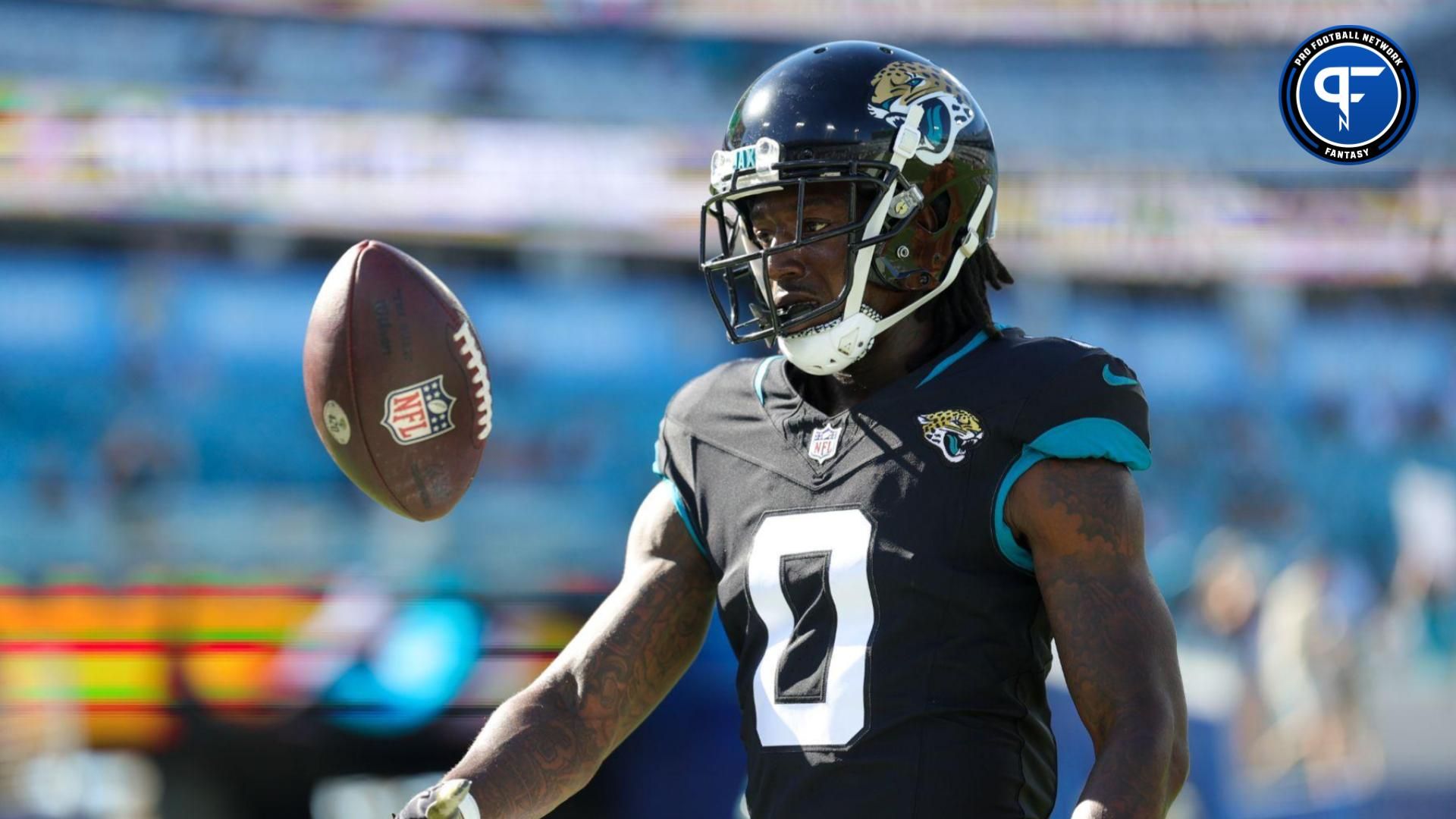After being heavily rumored to either sign with the New England Patriots or returning to the Jacksonville Jaguars, the Tennesee Titans swooped in to nab Calvin Ridley for four years and $92 million. After failing to live up to expectations last season, can Ridley improve his fantasy football value in Tennessee?
What Is the Fantasy Impact of Calvin Ridley Signing With the Tennessee Titans?
The Titans clearly have a type at wide receiver. From Andre Johnson to Julio Jones to DeAndre Hopkins and now Calvin Ridley, they want to sign great players. Their problem is they seem to be a day late (but definitely not a dollar short).
The Johnson and Julio signings were both outright disasters, both well past being capable of making any sort of meaningful contribution. Hopkins is clearly past his prime as well, but he was still effective last season.
A big reason Hopkins was able to make an impact is the Titans signed him at age 31, whereas Julio was 32 and Johnson was 35. Ridley is certainly on the older side as well, but he’s only 29. Physically, he should be able to go for another 3-4 years.
Calvin Ridley just got a BAG from the #Titans. 😮💨#TitanUp | #DUUUVAL pic.twitter.com/JZpuQqj3w6
— Pro Football Network (@PFN365) March 13, 2024
With that said, I am highly skeptical that Ridley plays out the entirety of this contract. The Titans gave Ridley elite WR1 money. Perhaps the 2020 version of Ridley would’ve been worth it. That year, he caught 90 passes for 1,374 yards and nine touchdowns. But four years is a very, very long time in the NFL.
Ridley played five games in the 2021 season before stepping away from football. He was not particularly effective during those contests. Then, Ridley missed the entire 2022 season due to a gambling suspension.
After returning in 2023, expectations were sky-high for Ridley. Training camp hype pushed Ridley’s ADP from the fifth or sixth round all the way up to the 2/3 turn by the time late August rolled around.
Fantasy managers who drafted Ridley were thoroughly disappointed with his production. Ridley commanded just a 22.6% target share, far lower than the 25%+ we expect from WR1s. He was targeted on just 21.4% of his routes run.
How come Trevor Lawrence didn’t throw to Ridley more? Sometimes, the simplest answer is the correct one. Ridley couldn’t get open. His 2.3 yards of separation on average was the 10th lowest in the league.
Then again, Amari Cooper only had 2.2 yards of separation on average. Interestingly, Hopkins also averaged just 2.3 yards of separation.
There’s definitely merit to the notion that the Jaguars did not do enough to scheme the ball to Ridley. He ran just 18% of his routes from the slot. His 13.2 aDOT (average depth of target) was 22nd in the league. The Jaguars kept trying to push the ball downfield to Ridley, never really giving him layup targets.
The counterpoint to that is they didn’t scheme the ball to Ridley because he didn’t warrant the ball being schemed to him. Christian Kirk was the best receiver on the Jaguars last season. I would argue Evan Engram was second.
Ridley averaged 1.6 yards per route run, 48th in the league, and 7.5 yards per target, 60th in the league. His catch rate fell to a career-low 55.9%.
READ MORE: 2024 WR Dynasty Rankings
To be fair, some of the blame can and should fall on Trevor Lawrence’s shoulders. Lawrence is nowhere near the talent he was made out to be. But Lawrence is a better quarterback than Will Levis. And Hopkins is far more formidable competition for targets than Kirk.
The Titans paid Ridley to be their WR1. He’s now the 10th-highest-paid receiver in the league. Yet, there are easily 36 receivers I would take over Ridley in both real life and fantasy, including the other guy on the Titans.
Ridley’s Presence Is a Problem for Hopkins’ Fantasy Value
Between Tony Pollard, Tyjae Spears, Ridley, and Hopkins, absent a massive step forward from Levis, there’s just no way this offense can support all of these players as fantasy assets.
The Titans haven’t been a fantasy goldmine for a long time. It’s mostly been Derrick Henry or pass. Now, they suddenly have 4-5 players that will be drafted in fantasy leagues. They can’t all produce.
Even at 32 years old, Hopkins is a superior receiver to Ridley. Since talent dictates volume, as much as the Titans may want Ridley to be the guy, based on what we saw last season, the targets are likely to end up going Hopkins’ way.
With that said, Ridley is there now. He’s still going to command at least an 18-20% target share. Some of those targets are going to come from Hopkins’ share. Granted, the Titans may now also throw the ball more with the switch from Mike Vrabel to Brian Callahan at head coach.
The Titans threw the ball the third-fewest times last year under Vrabel’s lead. In contrast, Callahan’s Bengals were inside the top 10. Then again, Callahan had Joe Burrow in Cincinnati, and Levis has yet to show he can be the same standard as Burrow. That will likely somewhat limit what Callahan does with this passing offense in 2024.
Last season, Hopkins averaged 13.2 fantasy points per game on a 28.6% target share. His 27.8% targets per route run rate was inside the top 10. The mere presence of Ridley is inevitably going to lower both of those numbers. As a result, it’s difficult to envision Hopkins producing any higher than he did last season.
KEEP READING: Fantasy Football Stock Up, Stock Down — Derrick Henry, Zack Moss, Aaron Jones, and More
If Hopkins does crack my top 36 WRs, it will be just barely. Ridley certainly won’t be there.
Despite the 4-5 fantasy-relevant names (including TE Chigoziem Okonkwo) on the Titans, this looks like an offense to avoid entirely.

